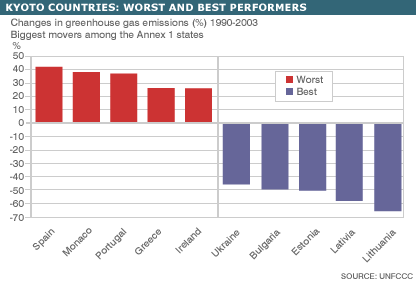Will Kyoto die at Canadian hands?
 London, UK (By Richard Black Environment Correspondent, BBC News website) - When the history of the Kyoto Protocol comes to be written, Canada will appear as a particularly influential figure in the narrative.
London, UK (By Richard Black Environment Correspondent, BBC News website) - When the history of the Kyoto Protocol comes to be written, Canada will appear as a particularly influential figure in the narrative.It has already played the role of Florence Nightingale, nursing the treaty back from the brink of oblivion.
Is Canada’s newly elected Conservative Party now preparing to don the mantle of Darth Vader and emasculate the protocol to the point of impotence?
“We’re very depressed,” said John Bennett, senior policy adviser to the Sierra Club of Canada, a prominent environmental group.
“We’re facing the unknown, because the Conservatives were very careful not to talk about Kyoto and climate change during the campaign, whereas in the 2004 election [Conservative leader] Stephen Harper said that if elected they’d withdraw from the protocol.”
All talk, no solutions
Back in 2002, with the treaty seriously wounded by President Bush’s decision to withdraw, it would very likely have withered and died had Canada followed suit; the numbers would not have added up, the momentum would have blown the treaty away.
Instead, the Liberal government ratified; Russia eventually followed, and Kyoto came into force.
The Conservatives, however, are not fans of the treaty; over the years it has been for them “a terrible treaty for the country” and “a phoney, wasteful exercise” which is “unworkable”.

Mr Harper has yet to set out what his climate policies will look like, and may not be able to until he has succeeded in constructing a coalition, the voters having left him short of an overall majority.
But Bob Mills, the Conservative Party’s environment spokesperson, is clear that opposition to Kyoto continues.
“I was at the [UN climate] meetings in Buenos Aires, in Montreal,” he told me.
“We had 180 countries all talking, but nobody coming up with solutions or how we’re going to get from Point A to Point B.”
Mr Mills expressed admiration for two other processes which have been initiated within the last 12 months: The Asia-Pacific Partnership on Clean Development and Climate, and the G8+5 grouping set up by Tony Blair’s UK government early last year.
On the surface such agreements can co-exist with Kyoto. Below the surface, they present a radically different political proposition; that climate change can be curbed by developing clean technology and rolling it out to industrialising countries, without the need for binding targets and timetables on reducing emissions.
Environmental groups have feared that the new Canadian government will follow the lead of its powerful southern neighbour and simply leave the Kyoto process behind in favour of these new initiatives.
Bob Mills believes that is unlikely, because it would embroil the nascent government in some difficult domestic politics.
Instead, he outlines a situation in which Canada would stay within the protocol, but make no attempt to meet its target for reducing greenhouse gas emissions.
“Our target is impossible,” he said, “and the question is, how many other countries are going to meet theirs?”
Impossible dream
Certainly the target gives Canada a big problem.
Its Kyoto commitment pledges that in the “first commitment period”, namely 2008-2012, emissions will be at least six percent lower than they were in 1990.
Currently emissions are about 25% above 1990 levels.
It is not the only country in this position; others, including Spain, Finland and New Zealand are also more than 20% off target.

If Canada were simply to ignore its treaty goal, would others follow suit?
Stephane Dion, environment minister with the out-going Liberal government, chaired the most recent United Nations climate meeting, held in Montreal at the end of 2005.
“It would be very bad news,” he said, “because Canada has been in the driving seat, and there is a need to set an example.
“Canada was able to show a plan to cut emissions to a point where we could meet the Kyoto target; and this really helped when I was travelling around the world [before the Montreal conference] to convince others we need a global approach for a global problem.”
Toothless treaty
Canada’s current position begs the question of how any country can simply ignore the requirements of a global treaty of which it is a fully paid-up member.
The reality is that unlike other international agreements such as the WTO, the Kyoto Protocol contains no meaningful sanctions.
If a member country (a “Party to the Treaty”) does not meet its target figure, the harshest form of penalty it can face is: “Deduction from the Party’s assigned amount for the second commitment period of a number of tonnes equal to 1.3 times the amount in tonnes of excess emissions.”
Translating from UN-speak, what that means is that if a country fails to meet its initial target in 2008-2012, it will be set a much stiffer target next time around.
The problem is that as things stand, there is no next time around.

There has been lots of think-tank talk about the “second commitment period”, the period after 2012, when countries could adopt a second, tougher set of targets.
But it does not yet exist; and without it, there is no penalty for a nation which takes up Bob Mills’s preferred option and simply ignores its first emissions target.
To complete the cycle, the more countries realise this, the less likely it is that tough second-generation targets will be agreed.
“It would give other countries reluctantly trying to keep up with Kyoto an excuse to say ‘yes, it is falling apart’,” observed John Bennett.
Which would leave alternatives such as the Asia-Pacific Partnership looking even more attractive.
However, projections presented at its first ministerial meeting earlier this month demonstrate that it will bring no reductions in emissions, lending credence to the views of the environmental lobby that it is merely a business deal between producers and consumers of coal and uranium.
Curbs on the Conservatives
Mr Harper’s Conservative Party may yet be persuaded to soften its resistance to Kyoto.
Prospective coalition partners could demand it; presumably there is a chance too that the Canadian people, who have shown significant support for the treaty in opinion polls, could signal their disapproval.
Stephane Dion is in no doubt about the importance of the government’s next move.
“If the government of Canada decides to forget all this, another champion will need to be found,” he said.
“The Canadian population is backing Kyoto and our party is backing it, and we will do our best to develop something to combat the worst ecological threat humanity has been faced with.”
That “something” may not be enough to save the Kyoto treaty, however, if the Conservative government sticks to its long-held line, and simply wishes its uncomfortable targets away.
You can return to the main Market News page, or press the Back button on your browser.

